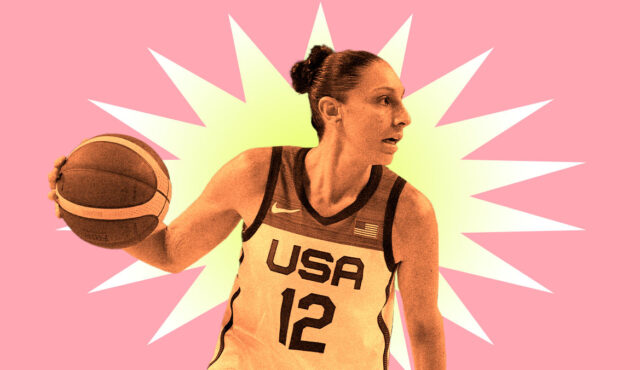In case you were wondering, showing up to play in the Olympics never loses its magic. If anyone should know, it’s USA Basketball and WNBA player Diana Taurasi, who at age 42, is playing in her sixth Olympic Games in Paris.
“The Olympics, it’s just a different feeling from any other event, whether it’s WNBA finals or opening night, there’s this anticipation right before opening ceremonies that’s really unmatched by anything in sports,” Taurasi says.
As Taurasi goes after a sixth gold medal, the spotlight is shining on women’s basketball brighter than ever. The Olympics come after a red hot college basketball season featuring rising star Caitlin Clark, and amid a WNBA season getting an unprecedented amount of national attention. Taurasi is happy for the enthusiasm, but also sees a bigger picture.
Experts In This Article
- Diana Taurasi, WNBA player, six-time Olympian, and the senior member of USA Basketball’s women’s team
“When you’ve been in a sport for over two decades, you kind of see the highs, the lows, the jolts of momentum,” Taurasi says. “Holding onto that momentum and making sure that it translates into longevity for our league is probably always the most important thing.”
Taurasi knows a thing or two about longevity, and is using that knowledge to help bridge that momentum going into the Olympics. Team USA captured a win in a showcase game against Germany three days before opening ceremonies, in large part because of the unusual amount of assists the team put up.
“When you put that USA jersey on, it brings a certain unselfishness to the way you approach the game of basketball, on and off the court,” Taurasi says. “As a team, you try to forge these relationships and this chemistry really quickly. We don’t have a lot of prep time. And I think when you play a game and you have the amount of assists we had last night, that’s telling you people are outside themselves for the greater good of what we’re trying to do: win the gold medal.”
That is just some of the perspective Taurasi brings to Team USA as its most senior member. She knows how important team bonding is, she knows to revel in extraordinary moments, and she knows things won’t always go your way. These are all pieces of wisdom she aims to impart to newer members of her team.
“The tough moments eventually are the ones that get you through the even tougher moments and then you appreciate those moments so much more,” Taurasi says. “So I just tell the younger guys that I’m around, just give yourself a little grace, take a step back, take a deep breath, and things will be okay.”
“It’s the work that keeps me coming back. I love the game. I love to work hard. I’m dedicated. And it makes me a better person.” —Diana Taurasi
Taurasi’s understanding of the importance of taking a moment to breathe underscores how cultivating health and wellbeing has been key to powering her two-decade career.
“[I’ve] been plant-based now for eight years, and that’s just trickled down to really every facet of the way [I] live, from rest to sleep to wellness,” Taurasi says. “It’s easy to say you want to be healthy, but really it’s the food that’s the medicine. And that’s kind of the approach I’ve taken, and I think that’s a big reason why I’m still playing.”
In particular, Taurasi cherishes her morning smoothie routine both for the nutrients it provides her with, as well as the grounding family moments.
“It’s not only something that I just love to make, it’s kind of the gathering place for our family in the morning to get the day going, and it’s filled with a bunch of goodness and it makes you feel good,” Taurasi says.
The Taurasi fam’s signature smoothie recipe? Frozen strawberries, bananas, blueberries, raspberries, chia seed, hemp seed, flax seed, spinach, peanut butter, vanilla protein powder, and either soy milk or oat milk. “We just put it in the blender and rip it up.”
From wellness habits to game tactics, Taurasi is proud to reflect on what she’s learned over her two decades of playing basketball professionally and in the Olympics. But the fact that people marvel at Taurasi’s illustrious career is also somewhat curious to her.
“I’ve gone back and forth with different feelings about it,” says Taurasi on the questions she gets about how she sustains longevity in her sport—and why she has yet to retire. She found those questions “disrespectful” at first because they seemed to imply that she had reached a certain point and gained a certain amount of accolades that meant she no longer needed to strive. “But I’ve changed my tune a little bit to where, you know what? You can have all the experience and you can have all the accolades. But it’s the work that keeps me coming back. I love the game. I love to work hard. I’m dedicated. And it makes me a better person.”
Through that dedication and work, she’s learned the only way to grow as an athlete and a person is to have those experiences herself—no skipping over the hard parts.
“I wouldn’t tell myself to do anything differently,” Taurasi says. “There’s something to be said about growth and evolving, and that only happens through experiences—good, bad, or indifferent. It’s just part of being a human being and you evolve and hopefully you make better decisions as you get older because you do have past moments that made life more difficult or easier.”
Except for maybe one thing she wishes beginners of all stripes would listen to, and that she could tell her younger self: “If anything, get a little bit more sleep.”











